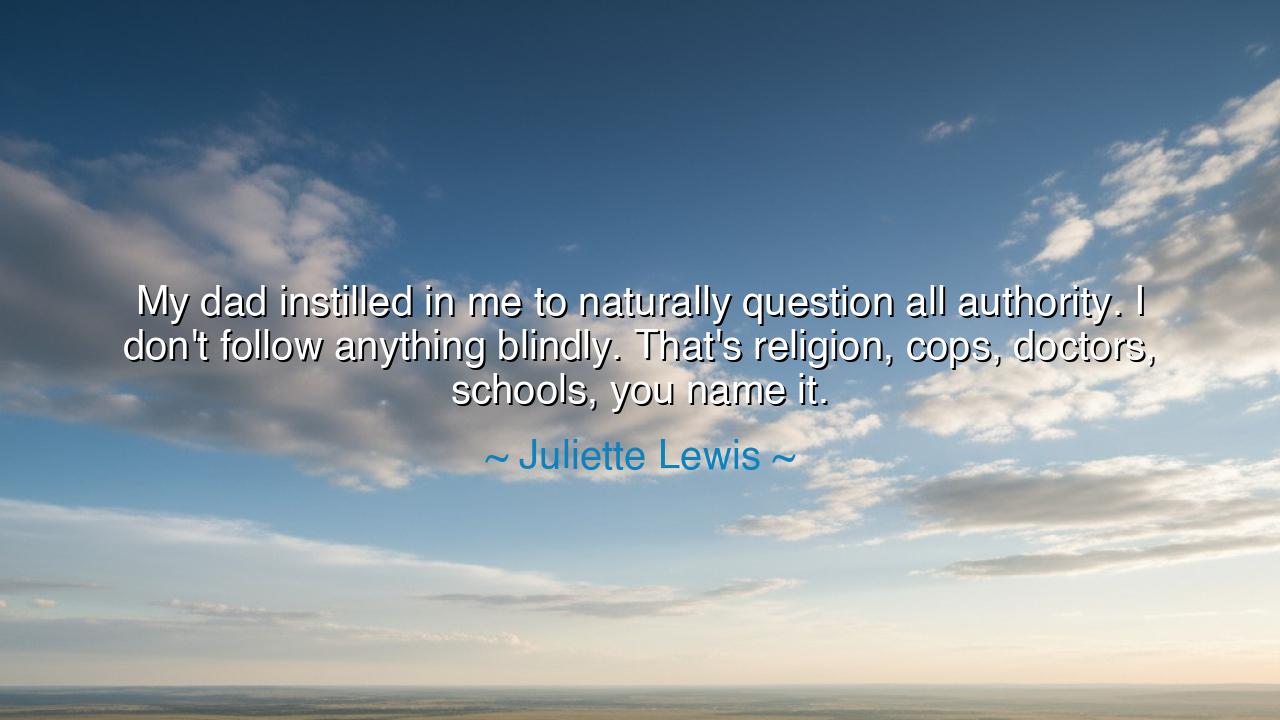
My dad instilled in me to naturally question all authority. I
My dad instilled in me to naturally question all authority. I don't follow anything blindly. That's religion, cops, doctors, schools, you name it.






In the fiery and fearless words of Juliette Lewis, we hear the voice of a rebel born not of defiance for its own sake, but of courage rooted in truth: “My dad instilled in me to naturally question all authority. I don't follow anything blindly. That's religion, cops, doctors, schools, you name it.” These words are not a cry against order—they are a call to consciousness. For the greatest danger to the human soul is not disobedience, but blind obedience; not rebellion, but the surrender of thought. To question is not to destroy—it is to preserve what is real, to test what is false, and to guard one’s freedom against the tyranny of unquestioned power.
The origin of this teaching lies in the home of a father who understood that true strength is not found in submission, but in discernment. Juliette Lewis, born into the vibrant chaos of art and individuality, was taught early that authority is not always wisdom, and that respect must be earned, not demanded. Her father, the actor Geoffrey Lewis, was a man of thought and independence, who instilled in his daughter a sacred skepticism—the same spirit that has guided prophets, philosophers, and revolutionaries through every age. Her words are a reminder that freedom of mind is the truest inheritance a parent can give a child.
The ancients understood this truth long before the modern world gave it voice. The philosopher Socrates, who walked the streets of Athens questioning politicians, poets, and priests, was condemned to death for “corrupting the youth.” Yet what he truly taught was the art of questioning—the discipline of inquiry that separates the wise from the credulous. His famous words, “The unexamined life is not worth living,” carry the same spirit as Juliette’s father’s lesson: do not follow blindly. Question, seek, challenge—even when it is uncomfortable. For the truth fears no question, but lies tremble at the sound of it.
History is filled with those who dared to question—and through their courage, humanity was lifted from darkness. Think of Galileo Galilei, who gazed through his telescope and saw that the Earth was not the center of the universe. When the Church demanded his silence, he whispered, “E pur si muove”—“And yet it moves.” His defiance was not rebellion against faith, but devotion to truth. Or remember Rosa Parks, who, by questioning an unjust law, set a nation’s conscience aflame. From their example we learn that to question authority is not to sow chaos, but to demand justice; not to insult order, but to cleanse it.
Yet Juliette Lewis’s words reach beyond the realm of politics or science—they touch the spirit of daily life. To question all authority means to stay awake in a world that lulls us to sleep. It means not accepting what doctors prescribe without understanding, not obeying what institutions demand without reason, not worshipping what religions declare without reflection. It means to listen to the voice within—the quiet whisper of one’s own conscience—and to weigh every command against the scales of truth. This is not arrogance, but humility before the mystery of life. For no human being, however wise or powerful, is infallible.
Still, there is danger in questioning without purpose. The wise do not reject authority for the sake of rebellion, but examine it to discover whether it serves truth or falsehood. To question rightly, one must cultivate both discernment and respect—the balance between skepticism and understanding. The cynic destroys without building; the seeker questions in order to learn. Juliette’s words remind us that questioning is not the destruction of trust, but the refinement of it. The true disciple is not the one who obeys blindly, but the one who understands deeply.
The lesson, then, is this: let your mind be free, but let your heart be disciplined. When faced with authority—whether it be a teacher, a priest, a ruler, or a law—ask not, “Who speaks?” but “What truth does this serve?” Do not rebel out of pride, but stand firm out of principle. Read widely, listen carefully, and never cease to test ideas against reason and conscience. For truth is not given—it is discovered, and it demands the courage to think for oneself.
So, my listener, remember the wisdom of Juliette Lewis and her father: never follow blindly. The world will always have those who claim to know what is best for you—some with good intentions, others with none. But the light of reason, once lit within you, can guide you through every darkness. Guard it. Question boldly, live consciously, and let no power—no matter how sacred—extinguish your will to seek truth. For to question is to be fully alive, and to live without questioning is to sleep through the miracle of existence itself.






AAdministratorAdministrator
Welcome, honored guests. Please leave a comment, we will respond soon